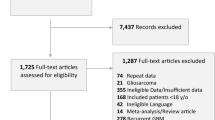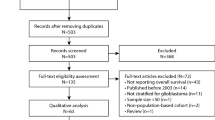Abstract
Recurrent pediatric high-grade glioma is a leading cause of cancer-related death in children. We report results of a systematic review and meta-analysis investigating survival outcome in pediatric patients with recurrent high-grade glioma over the last 20 years. MEDLINE/PubMed, EMBASE, Web of Science and Cochrane Review databases were searched for relevant studies reporting on survival outcomes for pediatric patients with recurrent high-grade glioma treated between 1996 and 2016. Progression-free survival (PFS) and overall survival (OS) were calculated cumulatively over all studies, by therapy subgroup, and by decade of treatment. Random effects models were used to control for heterogeneity as measured by the I2 statistic. A total of 17 studies across 4 treatment strategies were included. Eleven investigated traditional chemotherapy, 1 investigated targeted therapy, 3 investigated immunotherapy, and 2 investigated radiotherapy. A total of 129 patients were included with a median age of 10.0 years. Cumulative PFS was 3.5 months (95% CI 2.1–5.0). Cumulative OS was 5.6 months (95% CI 3.9–7.3). OS was 4.0 months (95% CI 1.9–6.1) using traditional chemotherapy, 9.3 months using targeted therapies (95% CI 5.4–13), 6.9 months using immunotherapy (95% CI 2.1–12), and 14 months using reirradiation (95% CI 2.8–25). OS between 1996 and 2006 was 4.2 months (95% CI 2.1–6.2) compared to 8.5 months (95% CI 5.6–11) after 2006. Pediatric patients with recurrent high-grade glioma suffer from poor PFS and OS, regardless of therapy. There may be a trend towards improved OS in the last decade.





Similar content being viewed by others
Explore related subjects
Discover the latest articles and news from researchers in related subjects, suggested using machine learning.References
Cage TA, Mueller S, Haas-Kogan D, Gupta N (2012) High-grade gliomas in children. Neurosurg Clin N Am 23:515–523. https://doi.org/10.1016/j.nec.2012.04.007
Broniscer A, Gajjar A (2004) Supratentorial high-grade astrocytoma and diffuse brainstem glioma: two challenges for the pediatric oncologist. The Oncol 9:197–206
Gottardo NG, Gajjar A (2008) Chemotherapy for malignant brain tumors of childhood. J Child Neurol 23:1149–1159. https://doi.org/10.1177/0883073808321765
Braunstein S, Raleigh D, Bindra R, Mueller S, Haas-Kogan D (2017) Pediatric high-grade glioma: current molecular landscape and therapeutic approaches. J Neuro-Oncol. https://doi.org/10.1007/s11060-017-2393-0
Liberati A, Altman DG, Tetzlaff J, Mulrow C, Gotzsche PC, Ioannidis JP, Clarke M, Devereaux PJ, Kleijnen J, Moher D (2009) The PRISMA statement for reporting systematic reviews and meta-analyses of studies that evaluate health care interventions: explanation and elaboration. J Clin Epidemiol 62:e1–e34. https://doi.org/10.1016/j.jclinepi.2009.06.006
Mahoney DH Jr, Strother D, Camitta B, Bowen T, Ghim T, Pick T, Wall D, Yu L, Shuster JJ, Friedman H (1996) High-dose melphalan and cyclophosphamide with autologous bone marrow rescue for recurrent/progressive malignant brain tumors in children: a pilot pediatric oncology group study. J Clin Oncol 14:382–388. https://doi.org/10.1200/JCO.1996.14.2.382
Chamberlain MC (1997) Recurrent supratentorial malignant gliomas in children. Long-term salvage therapy with oral etoposide. Arch Neurol 54:554–558
Wagner S, Erdlenbruch B, Langler A, Gnekow A, Kuhl J, Albani M, Volpel S, Bucsky P, Emser A, Peters O, Wolff JE (2004) Oral topotecan in children with recurrent or progressive high-grade glioma: a Phase I/II study by the German Society for Pediatric Oncology and Hematology. Cancer 100:1750–1757. https://doi.org/10.1002/cncr.20168
Shih CS, Hale GA, Gronewold L, Tong X, Laningham FH, Gilger EA, Srivastava DK, Kun LE, Gajjar A, Fouladi M (2008) High-dose chemotherapy with autologous stem cell rescue for children with recurrent malignant brain tumors. Cancer 112:1345–1353. https://doi.org/10.1002/cncr.23305
Saurez G, Cabanas R, Zaldivar M, Garnier T, Iglesias B, Piedra P, Castillo MR, Longchong M, Iznaga N, Lage A (2009) Clinical experience with nimotuzumab in cuban pediatric patients with brain tumors, 2005 to 2007. MEDICC Rev 11:27–33
Parekh C, Jubran R, Erdreich-Epstein A, Panigrahy A, Bluml S, Finlay J, Dhall G (2011) Treatment of children with recurrent high grade gliomas with a bevacizumab containing regimen. J Neuro-Oncol 103:673–680. https://doi.org/10.1007/s11060-010-0444-x
Lasky JL 3rd, Panosyan EH, Plant A, Davidson T, Yong WH, Prins RM, Liau LM, Moore TB (2013) Autologous tumor lysate-pulsed dendritic cell immunotherapy for pediatric patients with newly diagnosed or recurrent high-grade gliomas. Anticancer Res 33:2047–2056
Muller K, Scheithauer H, Pietschmann S, Hoffmann M, Rossler J, Graf N, Baumert BG, Christiansen H, Kortmann RD, Kramm CM, von Bueren AO (2014) Reirradiation as part of a salvage treatment approach for progressive non-pontine pediatric high-grade gliomas: preliminary experiences from the German HIT-HGG study group. Radiat Oncol 9:177. https://doi.org/10.1186/1748-717X-9-177
Ardon H, De Vleeschouwer S, Van Calenbergh F, Claes L, Kramm CM, Rutkowski S, Wolff JEA, Van Gool SW (2010) Adjuvant dendritic cell-based tumour vaccination for children with malignant brain tumours. Pediatr Blood Cancer 54:519–525. https://doi.org/10.1002/pbc.22319
Bouffet E, Khelfaoui F, Philip I, Biron P, Brunat-Mentigny M, Philip T (1997) High-dose carmustine for high-grade gliomas in childhood. Cancer Chemother Pharmacol 39:376–379. https://doi.org/10.1007/s002800050586
Bouffet E, Mottolese C, Jouvet A, Philip I, Frappaz D, Carrie C, Brunat-Mentigny M (1997) Etoposide and thiotepa followed by ABMT (autologous bone marrow transplantation) in children and young adults with high-grade gliomas. Eur J Cancer 33:91–95
De Sio L, Milano GM, Castellano A, Jenkner A, Fidani P, Dominici C, Donfrancesco A (2006) Temozolomide in resistant or relapsed pediatric solid tumors. Pediatr Blood Cancer 47:30–36. https://doi.org/10.1002/pbc.20516
Gilheeney SW, Khakoo Y, Souweidane M, Wolden S, Boulad F, Dunkel IJ (2010) Thiotepa/topotecan/carboplatin with autologous stem cell rescue in recurrent/refractory/poor prognosis pediatric malignancies of the central nervous system. Pediatr Blood Cancer 54:591–595. https://doi.org/10.1002/pbc.22347
Gilman AL, Jacobsen C, Bunin N, Levine J, Goldman F, Bendel A, Joyce M, Anderson P, Rozans M, Wall DA, Macdonald TJ, Simon S, Kadota RP (2011) Phase I study of tandem high-dose chemotherapy with autologous peripheral blood stem cell rescue for children with recurrent brain tumors: a pediatric blood and marrow transplant consortium study. Pediatr Blood Cancer 57:506–513. https://doi.org/10.1002/pbc.22899
Iwami K, Shimato S, Ohno M, Okada H, Nakahara N, Sato Y, Yoshida J, Suzuki S, Nishikawa H, Shiku H, Natsume A, Wakabayashi T (2012) Peptide-pulsed dendritic cell vaccination targeting interleukin-13 receptor alpha2 chain in recurrent malignant glioma patients with HLA-A*24/A*02 allele. Cytotherapy 14:733–742. https://doi.org/10.3109/14653249.2012.666633
Lashford LS, Thiesse P, Jouvet A, Jaspan T, Couanet D, Griffiths PD, Doz F, Ironside J, Robson K, Hobson R, Dugan M, Pearson ADJ, Vassal G, Frappaz D (2002) Temozolomide in malignant gliomas of childhood: a United Kingdom Children’s Cancer Study Group and French Society for Pediatric Oncology Intergroup Study. J Clin Oncol 20:4684–4691. https://doi.org/10.1200/JCO.2002.08.141
Papadakis V, Dunkel IJ, Cramer LD, Kramer E, Papadopoulos E, Goldman S, Packer RJ, Willoughby M, Baker D, Garvin J, Strandjord S, Coccia P, Kaplan AM, Klemperer M, Finlay JL (2000) High-dose carmustine, thiotepa and etoposide followed by autologous bone marrow rescue for the treatment of high risk central nervous system tumors. Bone Marrow Transplant 26:153–160
Verschuur AC, Grill J, Lelouch-Tubiana A, Couanet D, Kalifa C, Vassal G (2004) Temozolomide in paediatric high-grade glioma: a key for combination therapy? Br J cancer 91:425–429. https://doi.org/10.1038/sj.bjc.6601997
Jakacki RI, Cohen KJ, Buxton A, Krailo MD, Burger PC, Rosenblum MK, Brat DJ, Hamilton RL, Eckel SP, Zhou T, Lavey RS, Pollack IF (2016) Phase 2 study of concurrent radiotherapy and temozolomide followed by temozolomide and lomustine in the treatment of children with high-grade glioma: a report of the Children’s Oncology Group ACNS0423 study. Neuro Oncol 18:1442–1450. https://doi.org/10.1093/neuonc/now038
Wolff JE, Wagner S, Reinert C, Gnekow A, Kortmann RD, Kuhl J, Van Gool SW (2006) Maintenance treatment with interferon-gamma and low-dose cyclophosphamide for pediatric high-grade glioma. J Neuro-Oncol 79:315–321. https://doi.org/10.1007/s11060-006-9147-8
Wolff JE, Driever PH, Erdlenbruch B, Kortmann RD, Rutkowski S, Pietsch T, Parker C, Metz MW, Gnekow A, Kramm CM (2010) Intensive chemotherapy improves survival in pediatric high-grade glioma after gross total resection: results of the HIT-GBM-C protocol. Cancer 116:705–712. https://doi.org/10.1002/cncr.24730
Janssens GO, Gandola L, Bolle S, Mandeville H, Ramos-Albiac M, van Beek K, Benghiat H, Hoeben B, Morales La Madrid A, Kortmann RD, Hargrave D, Menten J, Pecori E, Biassoni V, von Bueren AO, van Vuurden DG, Massimino M, Sturm D, Peters M, Kramm CM (2017) Survival benefit for patients with diffuse intrinsic pontine glioma (DIPG) undergoing re-irradiation at first progression: a matched-cohort analysis on behalf of the SIOP-E-HGG/DIPG working group. Eur J Cancer 73:38–47. https://doi.org/10.1016/j.ejca.2016.12.007
Paganelli G, Grana C, Chinol M, Cremonesi M, De Cicco C, De Braud F, Robertson C, Zurrida S, Casadio C, Zoboli S, Siccardi AG, Veronesi U (1999) Antibody-guided three-step therapy for high grade glioma with yttrium-90 biotin. Eur J Nucl Med 26:348–357
Acknowledgements
C.N.K. is supported by the National Institutes of Health T32 Grant (T32CA128583-07), UCSF Clinical and Translational Science Institute Strategic Opportunities Support Program (UL1 TR001872), Alex’s Lemonade Stand Foundation (A120729), and Frank A. Campini Foundation. S.M. is supported by the National Institutes of Health National Center for Advancing Translational Sciences through UCSF-CTSI (KL2TR000143). This work was presented as a podium presentation at the 4th Pediatric Neuro-Oncology Basic and Translational Research Conference in New York, NY on June 16, 2017 and as an eTalk at the Society of Neuro-Oncology Annual Meeting on November 17, 2017.
Funding
No external funding was used to directly support this study.
Author information
Authors and Affiliations
Corresponding author
Ethics declarations
Conflict of interest
No contributing authors have any conflict of interest to declare.
Electronic Supplementary Material
Below is the link to the electronic supplementary material.
11060_2017_2701_MOESM1_ESM.docx
Table of all studies included in final statistical analyses. Thio = thiotepa; BCNU = carmustine; O6-BG = O6-benzylguanine; TMZ = temozolomide; Chemo = varied chemotherapy; Topo = topotecan; Carbo = carboplatin; HD = high-dose; ASCR = autologous stem cell rescue; Etopo = etoposide; DC = dendritic cell. (DOCX 105 KB)
Rights and permissions
About this article
Cite this article
Kline, C., Felton, E., Allen, I.E. et al. Survival outcomes in pediatric recurrent high-grade glioma: results of a 20-year systematic review and meta-analysis. J Neurooncol 137, 103–110 (2018). https://doi.org/10.1007/s11060-017-2701-8
Received:
Accepted:
Published:
Issue Date:
DOI: https://doi.org/10.1007/s11060-017-2701-8




